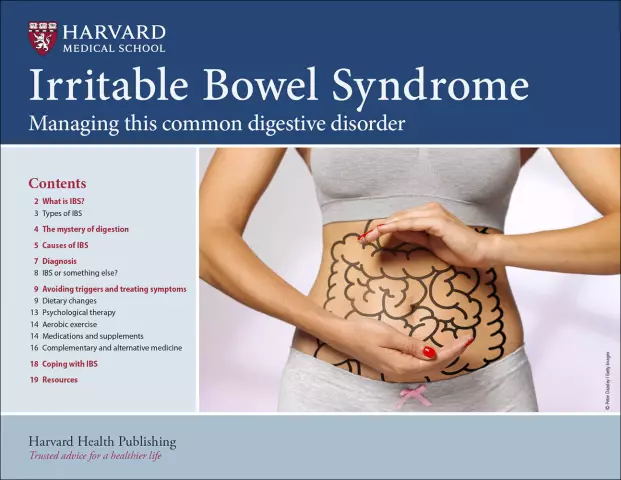- Author Rachel Wainwright wainwright@abchealthonline.com.
- Public 2023-12-15 07:39.
- Last modified 2025-11-02 20:14.
Bowel cancer

Bowel cancer is a malignant tumor of the intestinal mucosa. Cancer can develop in any part of the intestine, most often in the large intestine. Bowel cancer is very common and its incidence continues to increase, with the highest incidence in developed countries. Intestinal cancer is currently the second most common cancer among older people.
The most susceptible to this disease are people in the age group after 45 years, men and women to the same extent, every 10 years the incidence increases by 10%. Bowel cancer differs in histological structure, in 96% of cases it develops from glandular cells of the mucous membrane (adenocarcinoma).
Bowel Cancer Causes
There are three main signs of bowel cancer:
- Genetic predisposition. If the family has cases of bowel cancer, then family members are at risk. Moreover, if any of the family members are diagnosed with intestinal polyposis, this also indicates the genetic prerequisites for the occurrence of malignant intestinal cancer.
- Tumor and inflammatory bowel diseases. Colon cancer is usually preceded by a chronic condition called precancer. Such diseases include polyps, adenomas, chronic ulcerative colitis, Crohn's disease. These diseases are not malignant, but being untreated, they create preconditions for the occurrence of bowel cancer.
- A diet poor in plant fiber and rich in fatty protein foods. Such food contributes to the appearance of stagnant phenomena in the intestines, constipation and mechanical irritation of the intestinal walls with dense caked feces. Gastroenterologists believe that such food has become the main reason for the spread of intestinal cancer among people living in economically prosperous countries.
Bowel cancer symptoms
The disease can be asymptomatic for a long time, often the first symptoms of bowel cancer are mistaken for colitis. The main symptom of early bowel cancer is blood in the stool from the area affected by the tumor. Blood can be invisible, so it is important to conduct a preventive fecal occult blood test for all people at risk.
Symptoms depend on the stage and location of the bowel cancer. For tumors of the right section, diarrhea, abdominal pain and the presence of blood in the stool are characteristic, and subsequently iron deficiency anemia as a result of constant blood loss, for tumors of the left section - constipation and bloating. Signs of bowel cancer include persistent (lasting more than two weeks) dyspeptic symptoms: nausea, belching, feeling of heaviness in the abdomen, decreased appetite, irregular bowel movements.
Another characteristic symptom of bowel cancer is the appearance of an aversion to meat foods. As the disease progresses, signs of body poisoning with tumor decay products join the listed signs of intestinal cancer: a general decrease in tone, loss of strength, pallor of the skin, emaciation, increased nervousness.
In the later stages of bowel cancer, metastases appear - daughter tumors arising from the spread of cancer cells through the lymphatic or blood vessels. Metastases of intestinal cancer through the lymphatic pathways are transmitted to regional lymph nodes, then to the lymph nodes of the small pelvis and mesentery, hematogenously - to the lungs and liver. The most common colon cancer metastases occur in the liver.
Colon cancer diagnostics
It is extremely important to diagnose bowel cancer in the early stages of the disease, since the disease is slow, and timely measures can completely eliminate bowel cancer if it has not gone too far. The diagnosis is made after conducting the following studies:
- X-ray diagnostics of the intestine (irrigoscopy). It is an X-ray examination of the intestinal walls after the introduction of a radiopaque substance by means of an enema, for which a barium suspension is used.
- Retromanoscopy. The study of the intestinal area from the anus to a depth of 30 cm is carried out with a special device that allows the doctor to see the intestinal wall.
- Colonoscopy. Examination of the intestinal area from the anus to a depth of 100 cm.
- Laboratory examination of feces for occult blood.
- CT, MRI can determine the localization of the tumor, as well as the presence or absence of metastases.
Colon cancer treatment

Regardless of the stage of bowel cancer, the main treatment is surgical removal of the tumor. If the disease is diagnosed at an early stage, the treatment of bowel cancer can be sparing, in which case the tumor is removed endoscopically, using a retromanoscope or colonoscope. In other cases, an abdominal operation with an incision in the abdominal wall is required. The section of the intestine affected by the tumor is excised, the edges of the intestine are stitched together. In some cases, the operation is carried out in two stages: at the first stage, the tumor is excised, and the intestines are removed into an artificial opening on the side, a colostomy. At the second stage, the colostomy is removed, the sections of the intestine are stitched together, and the natural excretion of feces through the anus of the rectum is restored.
Chemotherapy and radiation are also used to treat bowel cancer. In the early stages, these methods are used as auxiliary in the main surgical, and are the prevention of metastases and relapse of the disease. In the later, inoperable stages, chemotherapy and radiation help relieve pain and improve the patient's general condition.
Forecast
The prognosis directly depends on at what stage of the intestinal cancer treatment was started. If the disease was diagnosed at an early stage, when the tumor has not gone beyond the mucous membrane, the five-year survival rate after removal of the tumor and adequate treatment for bowel cancer is about 97%. With the defeat of the entire intestinal wall without the formation of metastases - about 60%, in the presence of metastases, the prognosis sharply worsens, and if there are distant metastases, the five-year survival rate is no more than 35%.
Bowel Cancer Prevention
To prevent colon cancer, regular preventive medical examinations are necessary, especially for people at risk of this disease. A balanced diet, high in coarse vegetable fibers and fermented milk products, and low in animal fats, as well as fried and smoked foods, is extremely important. It is necessary to monitor regular bowel movements and take timely measures to eliminate constipation.
YouTube video related to the article:
The information is generalized and provided for informational purposes only. At the first sign of illness, see your doctor. Self-medication is hazardous to health!






